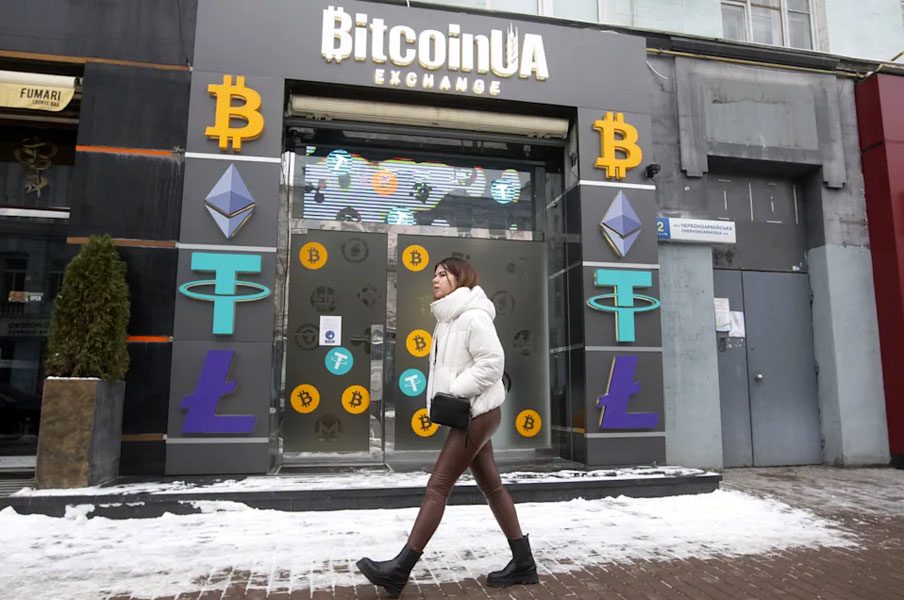A cryptocurrency exchange point in Kyiv, Ukraine, on January 24. STR/NurPhoto via Getty Images
Following the Russian invasion of Ukraine, countries worldwide have been turning to financial control instruments like sanctions on key Russian oligarchs as a way to pressure President Vladimir Putin to withdraw from the former Soviet republic. Alongside this, a global relief effort has begun to send funds and aid to the war-torn national.
With Ukraine’s economy so intertwined with Russia’s, the Ukrainian government has been looking for a funds channel that can be protected from the interference of Russia. Many financiers expect that Russia would be keen to seize any aid funding as reparations-of-sort in response to, for example, the US cutting Russia off from the global SWIFT payment system.
The answer the Ukrainians have found is a fully decentralized currency – namely, cryptocurrency. A tweet on February 26, 2022, on Ukraine’s official Twitter account pleaded for donations in BTC, ETH and USDT. On March 1, Ukraine began accepting Polkadot donations.
Stand with the people of Ukraine. Now accepting cryptocurrency donations. Bitcoin, Ethereum and USDT.
— Ukraine / Україна (@Ukraine) February 26, 2022
BTC – 357a3So9CbsNfBBgFYACGvxxS6tMaDoa1P
ETH and USDT (ERC-20) – 0x165CD37b4C644C2921454429E7F9358d18A45e14
But, as much as cryptocurrency is an important tool for Ukrainians to avoid Russian interception of relief funds, so too is it useful for Russian oligarchs and businesses to bypass financial sanctions and side-step the SWIFT payment system. In this article, we’ll explore how the Russo-Ukrainian war has put decentralized cryptocurrency at the forefront of financial debate.
How Ukraine is using crypto to mount its defence
Let’s start with the desirable uses of crypto in this conflict. It has been reported by Western media and Ukrainian sources that Russia’s invasion hasn’t exactly gone to plan. And whilst a ‘catastrophic cyberwar’ hasn’t yet begun between the two countries, it’s becoming increasingly more likely that Putin will turn to cybercrime to gain an edge in this war and cripple Zelenskyy’s government.
That’s why the Ukrainians have sought help from a secure cryptocurrency network to ask for help so that they can ensure these funds go directly to Ukrainian citizens. It is only with a secure, anonymous and decentralized medium of exchange can Zelenskyy’s government and NGOs ensure that Russia isn’t blocking or intercepting these fund transfers.
According to Elliptic, this crypto crowdfunding effort has been largely successful, with over $63.8 million in crypto assets making its way to Ukraine between February 24 and the morning of March 11. What is the Ukrainian government using these funds for? Bloomberg reports that $15 million of its crypto donations have been used to purchase military equipment and weapons to aid its resistance against the Russian invaders.
How Russian Oligarchs can use cryptocurrency to dodge sanctions
However, cryptocurrency also holds the key for sanctioned individuals to move their funds out of Western countries and operate as normal, given Russia’s exclusion from SWIFT.
Once Democratic presidential nomination candidate Senator Elizabeth Warren (D-MA) argued that “Cryptocurrencies risk undermining sanctions against Russia, allowing Putin and his cronies to evade economic pain.” And data shows that Russian interest in the digital currency has spiked since Russia invaded Ukraine.
It will now be much harder for Western nations to seize and control the assets of Russian oligarchs now that these individuals are turning to the unregulated crypto market. Therefore, will this conflict further encourage nations like the US, the EU and the UK to further crackdown on digital currency?
Cryptocurrency is therefore a double-edged sword. On one side, it’s allowing Ukrainians who are struggling to access banking systems and “real” money to mount their offensive against the Russian invaders.
But, crypto’s adoption weakens the ability of Western nations to use the global financial system to exert pressure on Russia going forward. Will they have to turn to other – less peaceful – means to oppose Putin in Eastern Europe?
Like what we have to say? Sign up to subscribe to email alerts and you’ll never miss a post.










